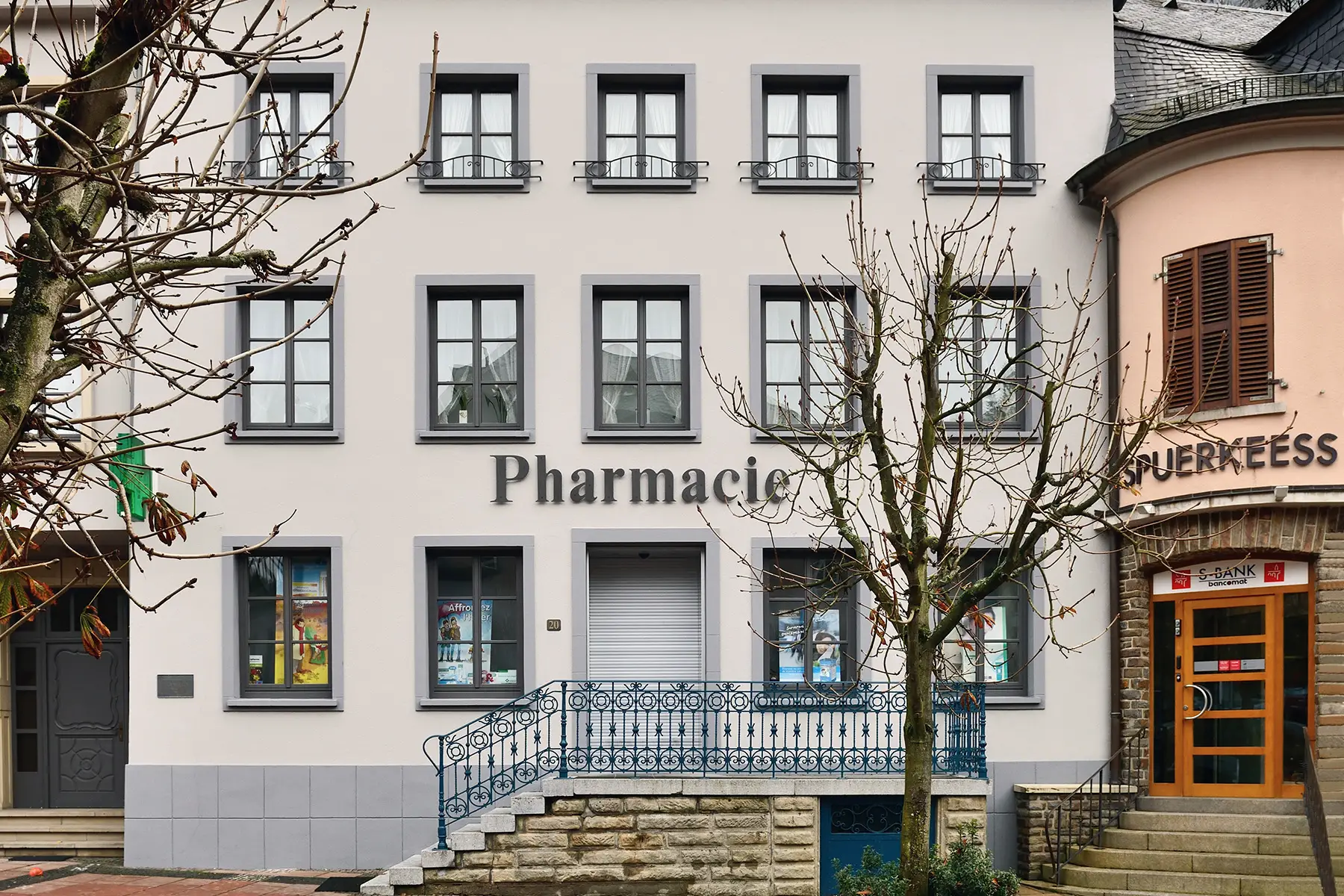Luxembourg has a multilingual, high-performing mental healthcare system with access to psychiatric care and psychological support. All residents are covered by public health insurance (CNS), which fully reimburses psychiatric treatment provided by approved specialists. However, psychotherapy with independent psychologists or therapists is usually not covered, and many residents use private insurance to access these services.
Here’s a more detailed breakdown, including:
- How does mental healthcare work in Luxembourg?
- How to access mental health services in Luxembourg
- Insurance for mental healthcare in Luxembourg
- Psychologists, psychiatrists, and therapists in Luxembourg
- Addiction services in Luxembourg
- Services dealing with eating disorders in Luxembourg
- Support for severe and long-term conditions
- Mental healthcare for children and young people in Luxembourg
- Support services for special groups in Luxembourg
- Emergency support and crisis lines in Luxembourg
- Useful resources
Cigna Global
Enjoy peace of mind while living in Luxembourg with Cigna Global’s long-term international health insurance plans (12+ months). Get tailored coverage, direct billing with many providers, complex case management, and global care on demand, with access to a network of 1.5+ million doctors, specialists, and therapists.
How does mental healthcare work in Luxembourg?
The Ministry of Health is responsible for healthcare policy and budget in Luxembourg. It works closely with the LLMH. The League is a voluntary organization that offers mental health services, support, information, awareness, and training. The Ministry of Health also runs a health portal with information on health policy, prevention programs, and citizen healthcare rights.

In the main, primary care for mental health in Luxembourg is available through state-funded healthcare. It consists of GP support plus psychiatric services within hospitals that offer outpatient and short-stay inpatient care. Those needing longer-term psychiatric help usually receive treatment at the Neuro-Psychiatric Hospital Center (Centre Hospitalier Neuro-Psychiatrique – CHNP).
Secondary care, on the other hand, is available through specialists offering services through state-funded healthcare as well as a network of voluntary organizations and private providers.
State health insurance in Luxembourg also covers treatment from GPs, medical specialists, hospital care, and long-term care. It is worth noting that health insurance also covers prevention and educational programs for children and older residents.
How to access mental health services in Luxembourg
If you feel that you need mental health support in Luxembourg, you can contact your GP who may refer you for specialist treatment if necessary. Alternatively, you can access services and treatment directly without a referral. You can search for registered mental health specialists on the Luxembourg Society of Psychology (Société Luxembourgeoise de Psychologie asbl – SLP) web portal and Doctena Luxembourg.
However, do keep in mind that you will need a doctor’s referral for in-patient psychiatric treatment. You can contact the CHNP’s polyclinic about a consultation.
Insurance for mental healthcare in Luxembourg
Residents in Luxembourg are entitled to mental healthcare through state health insurance. Your employer usually registers you when you start work. However, self-employed workers need to enroll themselves.
Health insurance in Luxembourg is managed by the National Health Fund (CNS – French: Caisse Nationale de Santé, German: Gesundheitskasse, Luxembourgish: d’Gesondheetskeess), which operates a reimbursement scheme. Most users need to pay costs upfront and then file for reimbursement from the state.
However, if you don’t work and cannot afford to make insurance payments, you can still access healthcare as a resident through your local social welfare office.
State health insurance in Luxembourg also covers dependent family members, who you need to list on your policy.

Coverage includes:
- 88% of the cost of general practitioner and specialist consultations
- In-patient hospital treatment, with a daily co-payment of €25.50 (as of 2025) for overnight stays
- Prescription medications, reimbursed at 100%, 80%, or 40%, depending on the classification of the drug
- Rehabilitation costs, when medically necessary and approved, including in some cases related to serious mental health conditions
- Long-term care for those with chronic or severe mental illness, covered separately under Luxembourg’s long-term care insurance (assurance dépendance) system
- 100% coverage for children under 18 for most standard medical services, including mental healthcare when approved
Mind the state coverage gaps
While Luxembourg’s public health insurance (CNS) covers most medical services, there are some important exclusions to be aware of.
Psychotherapy provided by independent psychologists or psychotherapists is not reimbursed, even for children, unless it’s delivered in a CNS-approved setting or by a medical specialist such as a psychiatrist. In these cases, you’ll need to pay out of pocket or have a private insurance policy that covers psychotherapy. Be sure to check the details of your private plan, as mental health coverage levels vary.
Short-term visitors from EU/EFTA countries can use their European Health Insurance Card (EHIC) to access medically necessary treatment, including mental healthcare when appropriate. Visitors from non-EU countries or those without CNS coverage will need to arrange private health insurance in advance if they expect to need access to care during their stay.
Private health insurance in Luxembourg
Unlike in many countries, Luxembourg doesn’t maintain a strict divide between public and private healthcare. Most health professionals work in private practice but have agreements with the national health fund (CNS) to provide care that’s reimbursed through the public system.
Patients pay the provider directly and then receive partial reimbursement, usually at fixed rates. Some providers, however, operate fully privately and are not covered by CNS, meaning their fees must be paid entirely out of pocket or through complementary insurance.
Having separate private health insurance in Luxembourg will enable you to: get treated by private-only professionals, cover up to 100% of your medical costs, and access treatments and services not covered by state funding.This includes most alternative therapies, sessions with psychotherapists, and a private room in the hospital.
A few of the largest international health insurance companies in Luxembourg that offer mental health coverage as part of some expat plans include:
Psychologists, psychiatrists, and therapists in Luxembourg
In Luxembourg, mental health professionals work across the public sector, private practices, and the nonprofit/voluntary sector. All are regulated by the Ministry of Health and must be registered with the Collège Médical. Many are also members of professional bodies such as the Société Luxembourgeoise de Psychologie (SLP).

You can usually access psychologists, psychotherapists, and psychiatrists without a referral for outpatient care. However, for inpatient psychiatric treatment, a referral from your GP or another specialist is typically required. The Prevention Depression website offers a clear overview of how these professions differ and where to find support.
Psychologists and psychotherapists provide talk therapy and emotional support in clinics, hospitals, or private practices. They cannot prescribe medication. Psychiatrists, who are medical doctors, work mainly in hospitals and are qualified to diagnose mental health conditions, prescribe medications, and request medical tests.
Specialized services are available, including child and adolescent psychiatrists, addiction therapists, and trauma-focused professionals. Psychiatric consultations are covered by state insurance at a rate of 88% for adults and 100% for children. In contrast, psychologists and psychotherapists usually operate privately, and their services are not reimbursed under public insurance.
Free or low-cost support is also available through nonprofits, such as the Ligue Luxembourgeoise d’Hygiène Mentale (LLHM) and other community-based organizations.
Psychotherapy and state insurance
Luxembourg’s national health insurance fund (CNS) distinguishes between psychiatric care, which is reimbursed, and psychotherapy, which—outside of hospital settings—is not. As of 2025, independent psychotherapists remain outside the CNS reimbursement system, following a breakdown in negotiations with the state over several key exclusions. These included:
- Coverage for introductory sessions
- Reimbursement for people already receiving antidepressants
- Coverage for patients under 18 or over 60
- Coverage following hospital-based psychotherapeutic care
Due to these exclusions, patients must pay out of pocket for most therapy sessions or have complementary private insurance to help offset costs. A list of licensed professionals and whether their services are eligible for private reimbursement can be found on the SLP portal.
Sessions typically last between 30 and 90 minutes, depending on the provider and treatment type. If paying privately, expect to pay €90–120 per session, though prices can range from €70 to €140.
You can follow ongoing updates and advocacy efforts through FAPSYLUX, the national federation representing psychotherapists.
Addiction services in Luxembourg
You can access addiction support through Luxembourg’s state health services. Of course, you can also contact specialist support at hospitals, clinics, and rehabilitation centers directly. However, you will usually need a referral from a doctor for in-patient care.

The CHNP has the Rehaklinik that offers rehabilitation for sufferers of alcohol and drug addiction. This includes:
- Outpatient support at the ÄDDI·C Center
- Inpatient treatment at therapeutic centers specializing in either drug or alcohol recovery
- The Orangerie 2 rehabilitation unit for those with long-term alcoholism issues
There is also an organization called Impuls that specifically helps young people with drug and alcohol misuse.
For other addictions, like compulsive gambling, shopping, or sex addiction, the organization ZEV provides anonymous counseling services.
Services dealing with eating disorders in Luxembourg
Support for people with eating disorders in Luxembourg is available through a combination of hospital services, private therapists, and nonprofit organizations, though specialized care can be limited. Major hospitals such as the Centre Hospitalier de Luxembourg (CHL) offer psychiatric and psychological support for conditions like anorexia, bulimia, and binge-eating disorder.
Access usually begins with a GP or psychiatrist, and inpatient care may be available in severe cases. Private psychologists, psychotherapists, and dietitians also provide targeted treatment, although their services are generally not reimbursed by public insurance unless part of a broader psychiatric care plan.
Nonprofit organizations like the LLHM may offer support groups or referrals, and youth-focused services such as CePAS and school psychologists can assist children and teens.
While Luxembourg does not yet have dedicated eating disorder clinics, multilingual support is often available, especially in Luxembourg City. However, English-speaking specialists may be limited, so early outreach and coordination across providers – such as therapists, dietitians, and medical doctors – are often necessary for comprehensive care.
Support for severe and long-term conditions
Those with severe or acute mental conditions in Luxembourg usually receive treatment from psychiatrists or other mental health specialists in hospital settings. There has also been a growth in supplementary community-based programs to help with rehabilitation and reintegration in recent years.
The CHNP is the main facility for those with severe mental health problems in Luxembourg. Its Rehaklinik is a national rehabilitation center and provides services including:
- Rehabilitation for those with psychotic disorders
- Specialist intensive care for those with acute conditions
- Outpatient psychiatry and psychotherapy
- Juvenile psychiatry
- Psychiatric support for conditions related to old age
- Supervision and support in prisons and detention centers
Support is mainly through the public healthcare system covered by state health insurance. Between 80–100% of costs are covered by state funds, with children and those unable to make contributions themselves receiving the full 100% funding.
Mental healthcare for children and young people in Luxembourg
Children receive free healthcare in Luxembourg via the health insurance of their parent or guardian. They generally see a family doctor as the first point of healthcare but don’t need a referral to access pediatricians or pediatric healthcare specialists. In fact, you can choose to have a pediatrician rather than a GP monitor your child’s health and development.
Children’s mental health in Luxembourg is monitored from around the age of two and continues through the early years and school years. If developmental or psychological problems are identified, help is available through the Early Rehabilitation Service (Hëllef fir de Puppelchen) which supports children up to the age of four.
If you’re concerned about your child’s mental wellbeing, you can speak with your GP, a child psychiatrist or psychologist, or the school’s healthcare team. Children can also access confidential mental health support independently through services like Kanner-Jugendtelefon (KJT).

While state health insurance covers psychiatric care for children, including consultations and medication, it does not currently reimburse psychotherapy provided by independent psychologists or therapists. As a result, families often need to pay privately or use complementary insurance to access these services. Hospital-based or specialist-led care may be reimbursed depending on the provider and setting.
Other organizations offering mental healthcare support include:
- National Children’s Office (Office National de l’Enfance – ONE) – offers psycho-social support to children and young people aged up to 27 years.
- Socio-Medical League (Ligue Médico-Sociale) – runs health and social support services from 12 socio-medical centers across the country.
- Psycho-social and School Support Center (Centre Psycho-social et d’Accompagnement Scolaires – CEPAS) – public sector body that provides support to individual families and through schools.
- Elizabeth Group Ambulatory Service (SIPO) – services include support and advice to children, young people, and families experiencing mental health problems, including those with disabilities.
Support services for special groups in Luxembourg
There are non-profit organizations in Luxembourg that offer mental health support specifically for people who identify as women. Women In Distress (Femmes en Détresse) provides counseling, advice, and refuge accommodation for women experiencing domestic violence. The Pro-Familia Foundation offers psycho-social advice and temporary accommodation to women in a range of difficult situations.
People in Luxembourg with disabilities can contact Info Handicap Luxembourg, which is the national disability council. They will provide information on what mental health support is available.
For refugees, UNHCR has a list of where to find support, including mental health services, in Luxembourg.
Emergency support and crisis lines in Luxembourg
The emergency number in Luxembourg is 112, which connects you to ambulance, fire, or police services. For non-life-threatening issues, you can visit the emergency department at most major hospitals or go to one of the Maisons Médicales (out-of-hours medical clinics) for urgent care when your regular doctor is unavailable.
Crisis lines in Luxembourg include:
- SOS Détresse – general crisis support for anyone in distress or experiencing suicidal thoughts. Call 45 45 45 (available 11:00–23:00, extended to 03:00 on Fridays and Saturdays).
- Kanner-Jugendtelefon – confidential support line for children and young people. Call 116 111 (free and anonymous).
- 12344 Psychosocial Helpline – multilingual line offering emotional and mental health support. Available 24/7 and open to everyone.
- Domestic Violence Helpline – for anyone experiencing domestic abuse. Call 2060 1060 (available daily from 12:00 to 20:00).
Useful resources
- National Health Fund – for information on public health insurance in Luxembourg
- Sante.lu – the government health portal with information on prevention (in French)
- Luxembourg League of Mental Hygiene (La Ligue Luxembourgeoise d’Hygiène Mental) – a voluntary organization that offers mental health services, support, information, awareness, and training in Luxembourg (in French)
- Luxembourg Society of Psychology (Société Luxembourgeoise de Psychologie) – you can search for registered psychologists and therapists in Luxembourg








